Ricky’s Band
In this analysis Ricky’s band will be treated as a single entity creating a minor character. Although each player in the band is entitled to their own designation as a minor character, the sum effect of all the players in the band playing together is greater than the individual and as such requires greater focus and analysis. Ricky’s band appears in I Love Lucy season one episode four, “The Diet”. The episode follows Lucy Ricardo as she tries to audition for a spot in her husband’s, Ricky Ricardo, show. The episode culminates in a song and dance number where Lucy successfully dances with her husband in front of a live audience. As Ricky is singing and Lucy is dancing the band plays with them in the background. The actors that make up the band are all non-credited extras, yet they add authenticity to the set as well as provide an opportunity for music to be played. Without the background appearances of the band to set the stage for where Ricky is playing the importance of his job could not be shown – this is a paid gig in front of a live crowd. The band therefore has business in the episode, an idea that Keathley explains as actions that “must be easily identifiable to the Viewer” which amounts in a definition of their character (106). The band’s business, playing the music for Ricky to sing to, not only defines their own characters but helps to define Ricky’s character as a major singer. The band helps to define characters but is not limited to that role. During the episode there is no overture or theme music played; the only time music is present is when characters are playing instruments. As such, without the band it would be impossible for the showrunners to include the musical accompaniment to the song and dance. Using the same definition of business, the band not only acts in an easily identifiable manner, but they also are heard in an easily identifiable manner. The professional sound coming from the band again legitimizes the importance of Ricky’s job and the subsequent risk of Lucy derailing the performance.
To further Keathley’s idea of business in this episode he states that business “employs objects for dramatic and expressive purposes” (105). As the scene with Ricky’s band begins it shows a single band member wearing a hat. When Ricky enters the scene, he makes a show of taking the hat from the band member. The band member and Ricky both use this hat for dramatic purposes as it signals to the viewer to focus on the performance that is about to begin. When the band member has the hat, the band is playing and should be the point of focus, but when Ricky takes it, he starts singing and becomes the focus of the show. Although minor this small signal allows the viewer to understand where their focus should be. Without the band, Ricky is the only person on which to focus. Minor characters conducting business therefore allow for small shifts in focus by the viewer so that the scene remains fresh and fast paced while simultaneously appropriating the larger actions in a scene.
Works Cited
Keathley, Christian. “Pass the Salt … and Other Bits of Business.” Screen, vol. 52, no. 1, 2011, pp. 105–13. MLA International Bibliography, https://eds-s-ebscohost-com.ezproxy.tru.ca/eds/detail/detail?vid=2&sid=8dc696bb-b480-419a-89cb-263f7e7baeb5%40redis&bdata=JnNpdGU9ZWRzLWxpdmUmc2NvcGU9c2l0ZQ%3d%3d#AN=2011441794&db=mzh
“The Diet.” I Love Lucy, written by Jess Oppenheimer, Madelyn Davis and Bob Carroll Jr, directed by Marc Daniels, Desilu Productions, 1951.

Provide Feedback